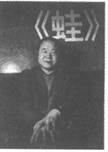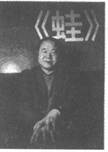题目内容
Mo Yan's Nobel Prize in Literature soon aroused public curiosity of the 57-year-old Chinese writer: Why was it he that was favored by the Swedish Academy? Chinese media seemed to be 36 as some journalists were reported to be on their way overnight to Gaomi City, Shandong, Mo's 37 where he stayed with his family.
Born in 1955 into a rural family, Mo 38 out of school and became a farmer when he was a(n) 39. He joined the military and devoted himself to 40 after Chinese literary circles started rethinking deeply the Cultural Revolution.
Mo's novel "Big Breasts & Wide Hips" tells a story of a mother who struggled and suffered 41 and tangled (缠结的) fates with Chinese people in the 20th century. His more recent work "Frog" more directly 42 China's one-child family policy, which helped 43 the country's population explosion 44 brought tragedies to farmers in the past 60 years.
"I think the reason why I could win the 45 is that my works present lives with unique Chinese 46 , and they also tell stories from a viewpoint of 47 human beings, which goes beyond differences of nations and races," Mo said to Chinese journalists. Mo also said many 48 arts originated from his hometown, such as clay sculpture, paper cuts, traditional new-year paintings, have 49 and influenced his novels.
Mo's prize may give powerful encouragement to the country's writers as the more 50 of Chinese lives their works are, the more possible they 51 as a world literature.
As the world's fast-developing country with a long history, China will 52 meet conflicts with western civilizations.__53_, the country faces internally a wide gap between the rich and the poor, 54 environment pollution and an aging population. Paying more attention to such 55 , Chinese writers may create more works that record the nation's journey to rejuvenation(复兴).With more Chinese writers like Mo, the world could learn a more real China. Perhaps, this is another reason for the Swedish Academy's choice. (words:338)
1. A.astonished B.ashamed C.embarrassed D.disappointed
2. A.business B.birthplace C.bookstore D.workplace
3. A.escaped B.ran C.dropped D.moved
4. A.adult B.citizen C.parent D.teenager
5. A.training B.writing C.farming D.speaking
6. A.hardship B.unemployment C.disease D.accident
7. A.adapted B.supported C.criticized D.praised
8. A.destroy B.cause C.increase D.control
9. A.and B.but C.or D.so
10. A.prize B.game C.respect D.profit
11. A.customs B.institutions C.characteristics D.feelings
12. A.particular B.usual C.strange D.common
13. A.advanced B.elegant C.folk D.royal
14. A.inspired B.interrupted C.prevented D.processed
15. A.imaginative B.reflective C.appreciative D.productive
16. A.admire B.arise C.fail D.lack
17. A.uncertainly B.unbearably C.unavoidably D.unacceptably
18. A.Otherwise B.Therefore C.However D.Meanwhile
19. A.worsening B.softening C.deepening D.widening
20. A.suggestions B.plans C.arguments D.problems
1.A
2.B
3.C
4.D
5.B
6.A
7.C
8.D
9.B
10.A
11.C
12.D
13.C
14.A
15.B
16.B
17.C
18.D
19.A
20.D
【解析】
试题分析:本文介绍了莫言获奖以后在中国所产生的影响,以及人们对莫言获奖的原因分析,进一步分析了中国的发展在文学和各方面所面临的问题。
1.A 形容词辨析。A惊讶B害羞C尴尬D失望;中国媒体对莫言获奖感觉很惊讶。
2.B 名词辨析。A生意B出生地C书店D车间;山东高密是他的出生地。
3.C 固定词组。Drop out of school辍学。
4.D 名词辨析。A成年人B居民C父母D年轻人;只有年轻人才可以参军。
5.B 上下文串联。根据上文他获得了诺贝尔文学奖说明他从事的是写作。
6.A 名词辨析。A艰难B事业C疾病D事故;在《丰乳肥臀》里女主角经历了生活的艰难。
7.C 动词辨析。A采纳B支持C批评D表语;在《雾》这部作品里他批评了中国的生育政策。
8.D 动词辨析。A破坏B导致C增加D控制;中国的生育政策控制了中国的人口增长。
9.B 连词辨析。中国的生育政策控制了人口增长也给农民们带来了悲剧。
10.A 上下文串联。根据上下文可知诺贝尔文学奖发给了莫言。这里是指这个奖项。
11.C 名词辨析。A风俗B机构C特点D感觉;指莫言的作品反应出中国当代的一些特征。
12.D 形容词辨析。A尤其,特别B常见C奇怪D普通;莫言的作品通过普通人的视野看待社会。
13.C 形容词辨析。A高级的B优雅的C民间的C皇家的;他的作品也受到民间艺术的鼓励影响。
14.A 动词辨析。A鼓励;B打断C预防D加工;他的作品也受到民间艺术的鼓励影响。
15.B 形容词辨析。A想象的B反应的C感激的,赞赏的;D多产的;莫言的获奖鼓励了中国其它的作家,因为他们的作品越能反应出中国的生活,他们就越有可能出现在世界文学之林。
16.B 动词辨析。A羡慕B出现C失败D缺少;他们就越有可能出现在世界文学之林。
17.C 副词辨析。A不确定地B难以忍受地C难以避免地D难以接受地;随着中国的发展,中国文化难以避免地要和西方文化发生冲撞。
18.D 副词辨析。A否则,要不然B因此C然而D同时;与此同时,中国还面临着贫富悬殊,更为糟糕的环境污染和人口老龄化现象。
19.A 形容词辨析。A更糟糕的B变软的C加深的D变宽的;中国还面临着贫富悬殊,更为糟糕的环境污染和人口老龄化现象。
20.D 名词辨析。A建议B计划C争论D问题。上文提及的都是中国面临的诸多问题。
考点:考查文化类短文阅读
点评:本文介绍了莫言获奖以后在中国所产生的影响,以及人们对莫言获奖的原因分析,进一步分析了中国的发展在文学和各方面所面临的问题。答题前一定要读懂全文,弄清文章要表达的思想,注意前后段落之间的关系。答题中,一定要认真分析,注意选项与上下文的关系,与前后单词的关系。对于一时没有太大的把握的题可以放到最后再来完成,因为有时答案可以从下文内容体现出来。答完后再通读一篇文章,看看所选选项能不能是语句通顺,语意连贯。


Neatly putting an emphasis on his storytelling skill is how writer Mo Yan began his Nobel Lecture in Literature speech, “Storyteller”, on Friday (Saturday, Beijing time) in Stockholm.
For 40 minutes he talked about his mother’s 36 on him as a person and a writer, his literary inspirations, and how he 37 with the controversy(争论)that followed the announcement of his Nobel victory.
He told his audience that as a boy he told stories to cheer up his mother, and 38 that poverty and loneliness fueled his imagination as a writer after he grew up. 39 , authors such as William Faulkner and Gabriel Garcia Marquez 40 him, he said, especially their bold and unlimited writing style.
“A person should be 41 in daily life, but follow one’s instinct(本能)and take control when it 42 to literary creation.”
He said the soul of 43 all of his works is the boy in Transparent Carrot who has an almost superhuman ability to bear 44 . He added that he also tried to make his hometown of Gaomi in Shandong Province a microcosm(缩影)of China and even the 45 .
His greatest challenge, he said, was writing novels that deal with 46 realities.
“In writing about the dark aspects of society there is a(n) 47 that emotions and anger allow politics to limit literature.”
He said literature must be 48 on real life but go beyond it.
He also mentioned the 49 surrounding his selection as Nobel winner, saying he was showered with many flowers. 50 he was a target for “stone throwers”.
“At first I thought I was the 51 of the controversies, but over time I’ve come to realize that the real target was a person who had 52 to do with me.”
Mo 53 his lecture by saying he was made to feel like an actor in a play with all the attention he was 54 , but he had decided that the best way to communicate his thoughts was to __55 writing.
| 【小题1】 |
|
| 【小题2】 |
|
| 【小题3】 |
|
| 【小题4】 |
|
| 【小题5】 |
|
| 【小题6】 |
|
| 【小题7】 |
|
| 【小题8】 |
|
| 【小题9】 |
|
| 【小题10】 |
|
| 【小题11】 |
|
| 【小题12】 |
|
| 【小题13】 |
|
| 【小题14】 |
|
| 【小题15】 |
|
| 【小题16】 |
|
| 【小题17】 |
|
| 【小题18】 |
|
| 【小题19】 |
|
| 【小题20】 |
|
Mo Yan's Nobel Prize in Literature soon aroused public curiosity of the 57-year-old Chinese writer: Why was it he that was favored by the Swedish Academy? Chinese media seemed to be 36 as some journalists were reported to be on their way overnight to Gaomi City, Shandong, Mo's 37 where he stayed with his family.
Born in 1955 into a rural family, Mo 38 out of school and became a farmer when he was a(n) 39. He joined the military and devoted himself to 40 after Chinese literary circles started rethinking deeply the Cultural Revolution.
Mo's novel "Big Breasts & Wide Hips" tells a story of a mother who struggled and suffered 41 and tangled (缠结的) fates with Chinese people in the 20th century. His more recent work "Frog" more directly 42 China's one-child family policy, which helped 43 the country's population explosion 44 brought tragedies to farmers in the past 60 years.
"I think the reason why I could win the 45 is that my works present lives with unique Chinese 46 , and they also tell stories from a viewpoint of 47 human beings, which goes beyond differences of nations and races," Mo said to Chinese journalists. Mo also said many 48 arts originated from his hometown, such as clay sculpture, paper cuts, traditional new-year paintings, have 49 and influenced his novels.
Mo's prize may give powerful encouragement to the country's writers as the more 50 of Chinese lives their works are, the more possible they 51 as a world literature.
As the world's fast-developing country with a long history, China will 52 meet conflicts with western civilizations.__53_, the country faces internally a wide gap between the rich and the poor, 54 environment pollution and an aging population. Paying more attention to such 55 , Chinese writers may create more works that record the nation's journey to rejuvenation(复兴).With more Chinese writers like Mo, the world could learn a more real China. Perhaps, this is another reason for the Swedish Academy's choice. (words:338)
| 【小题1】 |
|
| 【小题2】 |
|
| 【小题3】 |
|
| 【小题4】 |
|
| 【小题5】 |
|
| 【小题6】 |
|
| 【小题7】 |
|
| 【小题8】 |
|
| 【小题9】 |
|
| 【小题10】 |
|
| 【小题11】 |
|
| 【小题12】 |
|
| 【小题13】 |
|
| 【小题14】 |
|
| 【小题15】 |
|
| 【小题16】 |
|
| 【小题17】 |
|
| 【小题18】 |
|
| 【小题19】 |
|
| 【小题20】 |
|

